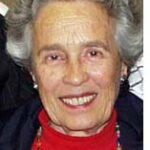By Eileen Wingard

LA JOLLA, California — Jewish Poets of the Past will feature Yiddish Poet Abraham Sutzkever and Israeli Poet Dahlia Ravikovitch, both recipients of the Israel Prize, that country’s most prestigious award. The program will be held in the Astor Judaica Library of the Lawrence Family JCC at 7 p.m., Tuesday May 7. To register click here.
Abraham Sutzkever (1913-2010) was called by The New York Times, “The greatest poet of the Holocaust.” He was born in Smargon, a town southwest of of Vilna. With the advent of World War I, his family was sent to Siberia, where he spent his early childhood.
After the 1920 death of his father, his family moved to Vilna. There, Abraham attended Polish-Jewish schools and later audited Polish literature classes at Vilna’s University. He also studied Yiddish literature privately and became part of the renowned group of Yiddish artists and writers known as Yung Vilne.
When the Nazis herded the 60,000 Vilna Jews into the ghetto, he was assigned to round up Jewish books to send to Frankfurt for an “Institute for the study of the Jewish Question.” While doing this, he managed to conceal precious books and artwork and smuggle arms into the ghetto. Both his mother and his newborn child were murdered by the Nazis. He and his wife escaped the ghetto and joined a group of partisans. Because of his fame as a poet, the Jewish Anti-Fascist Committee managed to airlift him and his wife to Moscow. There, his first of two daughters was born. Sutzkever testified at the Nuremberg Trials about the tragic fate of Vilna’s Jews.
After surviving the war, the Sutzkevers lived in Lvov, then Paris before immigrating in 1947 to Israel, a year before it was declared a state. There, Abraham founded the Yiddish literary journal, Di Goldene Keyt, which he published from 1949-1995. Sutzkever died in in Tel Aviv.
“I believe that as long as I was writing, I would have a weapon against death,” he said.
The eight poems of Abraham Sutzkever which will be read at the Jewish Poets of the Past program include three written during the Holocaust: “To My Child,” “Frozen Jews,” and “A Wagon of Shoes.”
Others were written during his years in Israel and deal with a variety of subjects: “Chagall’s Garden,” “Chosen Tree” (about Stradivarius choice of wood for his violins), “I Already Know the Taste” (about the snow in Kilimanjaro), “The Way to Paradise,” and “Who Will Remain?” The last poem, even though written in 1974, nearly thirty years after the Holocaust, still harkened back to those dark days. These poems will be read in their original Yiddish by Bernardo Bicas, Maty Bicas, Jack Cohen, and Sylvia Rosenthal. The English translations will be read by Eli Meltzer, Daniel Myers, Lisa Schwartz, and Jane Zeer. Elisheva Edelson will sing Sutzkever’s song, “Under the White Stars.”
Dahlia Ravikovitch (1936-2005) is considered Israel’s greatest woman poet of her generation. She was born in Ramat Gan, a suburb of Tel Aviv. Her father was killed in an auto accident by a drunk driver when Dahlia was six years old, the year her twin brothers were born. The family moved to Kibbutz Geva, where her mother remarried. Dahlia left the kibbutz at the age of 13 to live with foster parents in Haifa.
She studied literature at the Hebrew University and taught high school. She also worked as a theater and television critic. She married and divorced twice and later had a 13-year relationship with an attorney with whom she had a son, Ido Kalir.
Her poetry is lyrical and abstract. She deals with a wide range of issues, personal, general, local and international. She gives voice to those oppressed by tyranny and violence, recognizing injustices built into our society and culture.
Dahlia Ravikovitch’s poems to be read include, “A Picture,” “Pride,” “Around Jerusalem,” “Like Rachel,” “Delight,” “But She Had A Son,” “On the Road At Night There Stands the Man,” and “Surely You Remember.” They will be read in their original Hebrew by Arik Dumai, Yaira Haas, Sam Sasson, and Guri Stark. The English translations will be read by Michael Horvitz, Susie Meltzer, Phyllis Schwartz, and Liba Sherman. The program will conclude by Elisheva Edelson’s singing of Ravikovitch’s song, Rabbi Akivah.
The two segments of the evening will open with brief biographical sketches of the two poets, presented by the co-chairs of the evening, Janice Alper and myself. I will talk about Sutzkever and Janice will speak about Dahlia Ravikovitch.
Yiddish originals of some of the Sutzkever poems were located with the help of Caleb Sher, Senior Fellow at the Yiddish Book Center at Amherst, Massachusetts. Hebrew originals were identified with the help of the Israel-based master poetry teacher, Rachel Korazim.
*
Eileen Wingard is a freelance writer specializing in coverage of the arts. She may be contacted via eileen.wingard@sdjewishworld.com